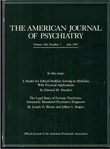Induction of depression with oxotremorine in patients with Alzheimer's disease
Abstract
Cholinergic neurotransmission has long been implicated in the development of depression. In this study seven patients with Alzheimer's disease were given oral oxotremorine, a long-acting cholinergic agonist, to assess the drug's effects on cognitive function. There were unexpected depressive reactions in five of the seven patients; three patients dropped out of the study because of the side effects. Cardiovascular effects of the drug were negligible, but its effect on memory and cognition remains unknown because of the small number of subjects who completed the study.
Access content
To read the fulltext, please use one of the options below to sign in or purchase access.- Personal login
- Institutional Login
- Sign in via OpenAthens
- Register for access
-
Please login/register if you wish to pair your device and check access availability.
Not a subscriber?
PsychiatryOnline subscription options offer access to the DSM-5 library, books, journals, CME, and patient resources. This all-in-one virtual library provides psychiatrists and mental health professionals with key resources for diagnosis, treatment, research, and professional development.
Need more help? PsychiatryOnline Customer Service may be reached by emailing [email protected] or by calling 800-368-5777 (in the U.S.) or 703-907-7322 (outside the U.S.).



